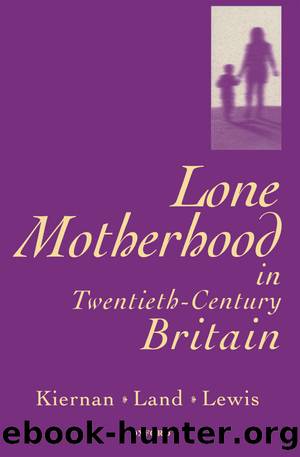Lone Motherhood in Twentieth-Century Britain by Kiernan Kathleen;Land Hilary;Lewis Jane;

Author:Kiernan, Kathleen;Land, Hilary;Lewis, Jane;
Language: eng
Format: epub
Tags: Unknown
Publisher: Oxford University Press, Incorporated
Published: 1998-08-15T00:00:00+00:00
The 1970s
The central issues in the social security debates at the beginning of the 1970s were therefore very different from the two previous decades. The relationship between the wages and benefit systems had been called into question by the rediscovery of poverty among children of working fathers and by the growing numbers of two- parent families subject to the wage-stop when fathers were sick or unemployed. (There was evidence that the difference between median male earnings and the lowest 10 per cent of male wage earners was growing despite the Labour Governmentâs attempts in incomes policies to target proportionally higher wage increases on the low paid.) Increases in family allowances had been linked to adjustments in child tax allowances thus raising the issue of the relationship between the tax and social security systems. Evidence of poverty among children, particularly among children of lone parents, was growing. Dennis Marsdenâs study of lone parents living on what was national assistance at the time of the research was published in 1968. The Government was committed to collecting and publishing. more evidence about the circumstances of lone parents and there was an active lobby monitoring both the extent and nature of poverty among families as well as evaluating policy responses. Claimants were beginning to find a voice and getting informed advice from a growing welfare rights movement and the re-emerging womenâs movement at the end of the 1960s enabled women, including lone mothers, to speak for themselves.
The reforms of the social security system proposed in Richard Crossmanâs White Paper in 1969 did not reach the statute book before the Labour Government was replaced by a Conservative Government in 1970. The incoming Governmentâs response to poverty among children in families with working parents was to introduce a means- tested scheme of family supportâFamily Income Supplement (FIS). They were opposed to across-the-board increases in family allowances, even coupled with an extension of âclaw-backâ because this would bring more family men into the tax system and their intention was to reduce tax and the number of taxpayers. At this time the tax threshold was below the SB level for a married man with two children. (Jim Callaghan, Chancellor of the Exchequer when family allowances were increased in 1967 and 1968, and Dennis Healey, Chancellor of the Exchequer in the 1970s Labour Government, had also favoured a means-tested increase.)
FIS was a new benefit âfor families with small incomes where the breadwinner is in full-time work and there are dependent childrenâ (FIS Bill, clause 1). The amount to be paid was based on half the difference between the familyâs ânormal gross incomeâ and the âprescribed amountâ which increased with the number of children (£15 for a one-child family and £2 for each additional child). Breadwinners could be a man or single womanâa single woman being defined as âany woman other than one who is a member of the same household as a man to whom she is married or with whom she is living as his wifeâ (FIS Bill clause 17).
Download
This site does not store any files on its server. We only index and link to content provided by other sites. Please contact the content providers to delete copyright contents if any and email us, we'll remove relevant links or contents immediately.
Should I Stay or Should I Go? by Ramani Durvasula(7658)
The Lost Art of Listening by Michael P. Nichols(7494)
The Rosie Project by Graeme Simsion(6381)
Beartown by Fredrik Backman(5737)
We Need to Talk by Celeste Headlee(5608)
Ego Is the Enemy by Ryan Holiday(5415)
Hunger by Roxane Gay(4922)
Suicide Notes by Michael Thomas Ford(4823)
I Love You But I Don't Trust You by Mira Kirshenbaum(3866)
Mummy Knew by Lisa James(3686)
Not a Diet Book by James Smith(3411)
Crazy Is My Superpower by A.J. Mendez Brooks(3398)
Toxic Parents by Susan Forward(3284)
Girl, Wash Your Face by Rachel Hollis(3282)
The Complete Idiot's Guide to Coping With Difficult People by Arlene Uhl(3145)
The Social Psychology of Inequality by Unknown(3019)
Name Book, The: Over 10,000 Names--Their Meanings, Origins, and Spiritual Significance by Astoria Dorothy(2979)
The Hard Questions by Susan Piver(2967)
The Gaslight Effect by Dr. Robin Stern(2791)
